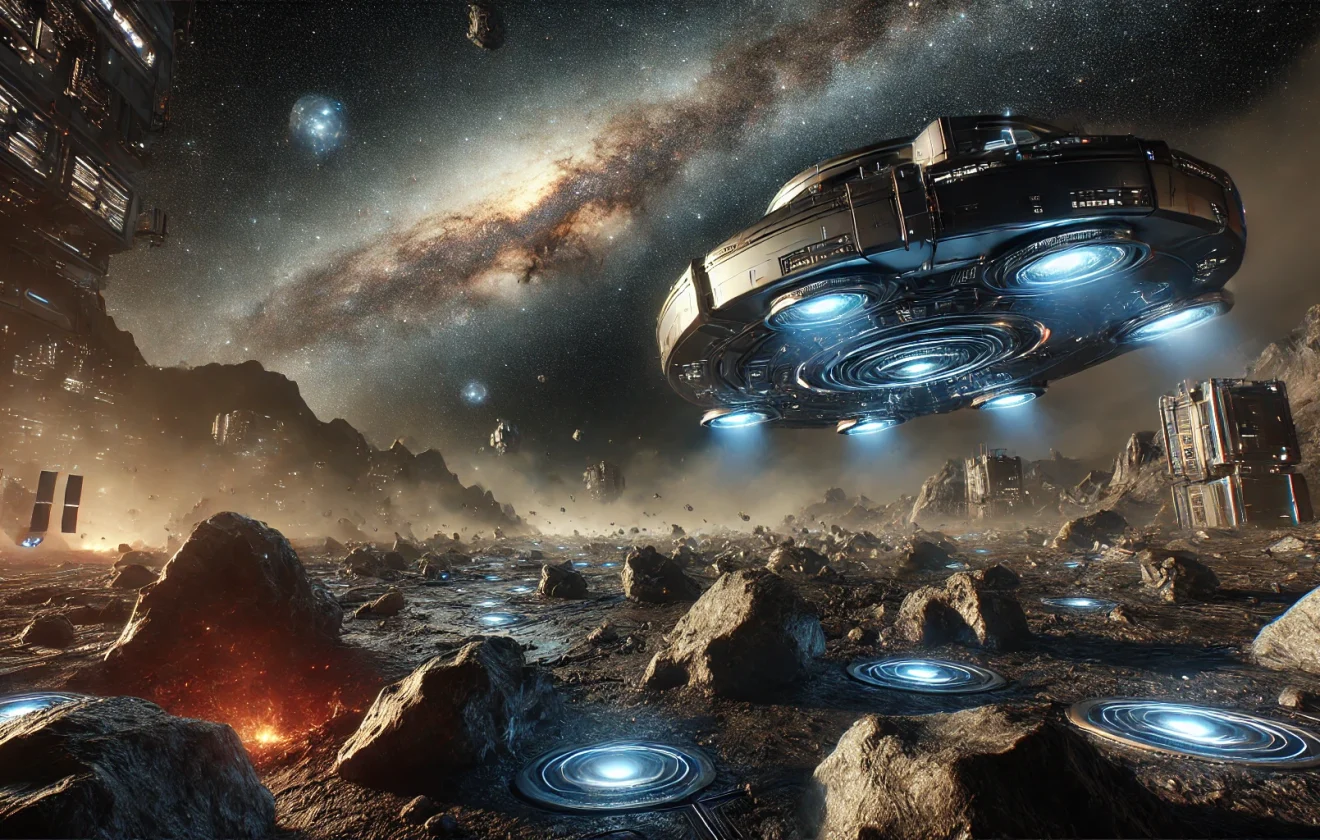AI in Space Law: Preparing for the Final Frontier
As humanity ventures further into the cosmos, a new era of exploration and development is on the horizon. With the increasing use of artificial intelligence...

As humanity ventures further into the cosmos, a new era of exploration and development is on the horizon. With the increasing use of artificial intelligence (AI) in space missions, the field of space law is rapidly evolving to address unprecedented challenges. This confluence of advanced technology and international legal frameworks is shaping the future of space exploration, commerce, and governance.
This article delves into how AI is revolutionizing space law, addressing critical legal issues, and preparing humanity for the final frontier. By exploring the implications of AI in space exploration, commercialization, and ethical governance, we aim to provide a comprehensive guide to understanding this transformative interplay.
AIDA Framework#
Attention: Why AI in Space Law Matters Now#
Imagine a future where autonomous spacecraft mine asteroids for precious metals, satellite constellations manage global communications, and AI systems navigate interplanetary missions. This future is fast becoming reality. As technology accelerates, legal systems must evolve to ensure that these innovations benefit humanity while mitigating risks.
Space law, traditionally rooted in treaties and agreements designed for government-led space activities, faces new challenges in the age of private space companies and AI-driven operations. The emergence of AI complicates legal questions around liability, intellectual property, ethics, and sovereignty. Without robust legal frameworks, this “Wild West” of space development could lead to conflicts, environmental damage, and inequity.
Interest: The Role of AI in Space Activities#
AI systems are indispensable for modern space operations. From analyzing massive datasets for astronomy to enabling autonomous spacecraft navigation, AI drives innovation and efficiency in space exploration. For example:
- Satellite Management: AI optimizes satellite constellations to avoid collisions and ensure effective global communication.
- Autonomous Exploration: AI-guided rovers and probes explore distant planets and moons without direct human intervention.
- Space Mining: AI assesses the composition of celestial bodies and streamlines resource extraction processes.
While these advancements open exciting opportunities, they also create legal complexities. Who is responsible if an AI system fails during a mission? How should the profits from space mining be shared? AI introduces new dimensions to longstanding questions in space law.
Desire: Building a Legal Framework for AI in Space#
To harness the potential of AI in space exploration, international cooperation and proactive regulation are essential. A robust space law framework can:
- Promote Innovation: Clear legal standards encourage investment in AI and space technology by reducing uncertainty.
- Ensure Accountability: Define responsibility and liability for AI-driven actions in space.
- Protect the Commons: Safeguard outer space as a shared resource, preventing monopolization or misuse.
The United Nations’ Outer Space Treaty (1967) established the foundation for space law, emphasizing the peaceful use of space and the protection of all humankind’s interests. However, the treaty must be updated to address AI’s unique challenges and opportunities.
Action: Preparing for the Final Frontier#
Governments, private companies, and international organizations must collaborate to adapt space law for the AI era. Key steps include:
- Establishing AI-Specific Standards: Develop international guidelines for the ethical use of AI in space activities.
- Defining Liability: Clarify responsibility for AI-driven operations, especially in the case of malfunctions or accidents.
- Ensuring Inclusivity: Create mechanisms to share the benefits of space resources equitably among nations.
By addressing these priorities, we can ensure that AI’s role in space is transformative, responsible, and inclusive.
SCQA Framework#
Situation#
Humanity is on the brink of a new era in space exploration, driven by breakthroughs in AI and private sector involvement. Autonomous spacecraft, satellite swarms, and space-based AI systems are redefining our relationship with the cosmos. However, existing legal frameworks are ill-equipped to handle the complexities introduced by these technologies.
Complication#
AI’s rapid integration into space activities raises significant legal questions:
- Who is liable if an AI system causes damage in space?
- How can intellectual property rights be enforced for AI-developed technologies?
- What ethical guidelines should govern AI’s decision-making in space?
Additionally, the commercialization of space resources—enabled by AI—threatens to exacerbate inequalities and create conflicts over sovereignty and ownership.
Question#
How can we update space law to address these challenges, ensuring that AI contributes positively to space exploration and benefits humanity as a whole?
Answer#
A coordinated international effort is needed to modernize space law, incorporating AI-specific considerations. This effort should prioritize accountability, ethical governance, and equitable access to space resources.
Key Legal Challenges of AI in Space#
1. Liability and Accountability#
AI systems in space operate with high degrees of autonomy, making it difficult to assign responsibility when things go wrong. For instance:
- If an autonomous spacecraft collides with a satellite, who is liable—the spacecraft’s operator, the AI developer, or both?
- Can AI systems themselves bear responsibility, or must humans always be accountable for their actions?
Legal frameworks must define clear guidelines for liability, balancing the roles of operators, manufacturers, and AI systems.
2. Intellectual Property Rights#
AI plays a significant role in creating new technologies and solutions in space exploration. However, this raises questions about intellectual property (IP):
- Who owns the discoveries made by AI systems in space?
- How can IP rights be enforced across international borders in a domain that belongs to all humankind?
3. Ethical Decision-Making#
AI’s ability to make autonomous decisions poses ethical dilemmas. For example, if an AI system must choose between saving its mission or avoiding environmental harm, what guidelines should dictate its decision? Establishing ethical principles for AI in space is critical to avoid unintended consequences.
4. Resource Allocation and Sovereignty#
AI enables efficient space mining and resource extraction, but this raises concerns about sovereignty and equity:
- Who has the right to exploit resources from asteroids or the Moon?
- How can the benefits of space commercialization be distributed fairly?
International agreements must address these issues to prevent conflicts and ensure sustainable development.
Opportunities for Collaboration and Progress#
1. International Treaties and Agreements#
Updating treaties like the Outer Space Treaty is essential to address AI-specific challenges. Proposals include:
- Establishing an international regulatory body to oversee AI in space activities.
- Creating a global fund to share the benefits of space resources equitably.
2. Industry Standards#
Private companies are at the forefront of AI-driven space innovation. Collaboration between governments and industry can:
- Develop voluntary standards for ethical AI use in space.
- Encourage transparency and accountability in AI development.
3. Public-Private Partnerships#
Partnerships between governments and private entities can fund research, develop legal frameworks, and promote responsible AI use in space exploration.
FAQs About AI in Space Law#
Conclusion: Preparing for the Final Frontier#
As AI propels humanity into the cosmos, space law must evolve to address its transformative impact. By proactively addressing challenges around accountability, ethics, and resource allocation, we can ensure that AI-driven space exploration is responsible, inclusive, and sustainable.
The final frontier holds immense promise, and with the right legal frameworks, we can harness AI’s potential to benefit all of humanity. Through international cooperation, innovation, and ethical governance, we can prepare for a future where AI and space law guide us toward the stars.














The AI regulation and compliance section is spot on. With the rise of AI adoption, ethical considerations will be crucial.…